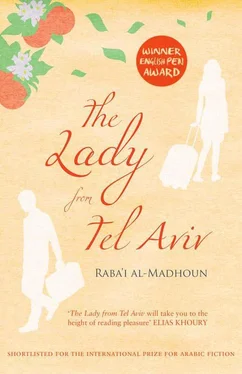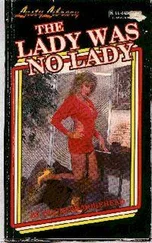‘“Dani and Dana” …?’ I muse.
She continues: ‘So, Dani’s classmate. They had long conversations about Dani’s decision to become an Israeli. He told him: “You’ll be another number in the annals of Jewish immigration to Palestine, but you’ll never be more than a second-class citizen no matter what you do. You’ll be given a house easier than you know. Probably in a settlement built on Palestinian land. You’ll do your service in the Israeli army, and only if you’re killed or badly wounded will your service come to an end. If you come out all right, you’ll remain in the reserves for ever, waiting to be called up for the next war. You’ll be thrown into a fight that’s not yours at all, or that hasn’t been yours until now, at least. Perhaps you’ll kill someone or become someone’s jailer. Maybe you’ll refuse to serve and become a conscientious objector. My friend, making aliya is a package deal. You can’t choose this or that part and leave the rest behind. You buy it all, you can’t haggle, and you can’t pay for it in instalments.”’
I nod, and say, ‘If I was his classmate, I would say the same.’
‘And what about me?’ she asks.
I don’t reply, and she finishes the story: ‘Anyway, you’re just repeating what he said to me after he had been in Israel for some time, that everything his friend had said was true. He said he was sorry, that our relationship had been based on a deceptive contract. “You brought me to Tel Aviv, to a land I’d never belong to,” he said. “You found yourself a lover immigrant. And I went with you, and with you I got Israel. But the deal’s off now. I’m cancelling it. I have to go.” And he left.’
‘Did you meet him after that?’
‘Actually, I came to London to convince him to return, to me at least if not to Israel. But it was a “mission impossible”. The young Communist was still living inside him. Dani came to London a few years after perestroika , when his Jewishness awakened. He searched for himself in London, without success. He fell in love with me, and agreed to join me in Israel in the hope he might find his true self. I don’t blame him. He was not born there, his memories are not from there.’
‘I am sorry for your loss,’ I say. ‘But Dani did the right thing.’ At this she looks away, then down, then out the window. ‘Listen, Dana,’ I continue, ‘if this land was promised to the Jewish people by your God, as lots of Jewish people say and even believe, what about the Arabs’ God? If God exists, He must belong to everyone. He must be just and fair and wise. There’s no way God would take the land away from one people in order to give it to another. No God would ever do that. No God would ever don the uniform of a settler and send armies out to kill and oppress. God would never do such a thing, because if He did it would mean He had stooped to our level. I’m sure Dani had reached this conclusion through his experience.’
‘I had similar experience to Dani’s. Should I leave, too?’
I’m not sure what she means by this, but after a few moments’ silence, without really agreeing to, we stop talking. Dana picks up her small headset and covers her ears. She turns off the overhead lamp, and puts her seat back as far as it will go. She adjusts how she is sitting and sinks into the backrest. I realize she wants a bit of rest, some respite from the conversation that remains wide awake in the depths of the night. I follow suit and soon we are both asleep.
At the first moments of dawn, our eyes open to the flashing seatbelts light, and the sound of the stewardess announcing that our plane is preparing to land.
The plane shudders over the sea. The water appears to rush at us as if it were trying to cover our wheels. Then scattered palm trees begin to throw themselves at us just before the plane shakes one last time as it hits the runway. The aircraft finally begins to slow down like a person trying to catch their breath after a long run. It pivots on the runway and heads toward the gates where it will rest, exhausted after its journey.
So this is Palestine. Fifty-seven years after the Nakba I experienced as a child. I have carried the Catastrophe inside me ever since Asdud fell. And now, here I am returning, searching for a piece of Palestinian soil to kiss. But there’s nothing here to kiss but a tiled corridor and a terminal hall filled with throngs of passengers. They mill around in front of the passport control booths and pretend they are queuing up.
I take my place in a line and an image comes into my mind — this is right where Leah Portman stood more than two years ago. Or maybe she stood over there. My eyes search for footprints, even though I know there are none. I met Leah at a literary event at the School of Oriental and African Studies more than a year ago, when she gave a talk about her first visit to Israel and Palestine. About three months ago I called her and told her I was thinking about visiting Israel on my way to Palestine.
‘I’ll be there at the same time,’ she exclaimed. ‘I’m going to visit my sister who lives in Israel.’ I proposed that we travel together, and she was enthusiastic, ‘Great idea, let’s do it.’
I suddenly expanded my invitation, ‘Would you take me to Israel and be my friend and translator? I’ll take you to Gaza to meet my mother.’ Would I have really done that? I can picture myself, introducing her to my mother and the rest of my family, ‘This is Leah, Leah Portman, a Jewish woman from Britain who’s a friend of mine.’ They would go insane! First of all, they would absolutely refuse to accept that we were just friends — platonic friends. Then they’d start to beat the drums of scandal against me, their so-called relative, who after so many years, comes back home with a woman who is neither wife nor cousin. I can already hear what my cousins would say, ‘He comes back with this woman in tow, but that’s not all. Noo! He comes with a Jewish woman!’ And then the women would start to chime:
Leah, Leah, little girl,
Blondie, blondie, German curls!
Forty years he’s been away,
With a Jew he’s back today!
My mother would join right in, crying out, ‘What shame! You left and returned in shame, you’re going out and doing who knows what with whom! Go send her home before they kill her and get you too.’
Better to follow the advice of the narrator in Samir El-Youssef’s novel Pentonville Road, when the narrators tells Kathy, who visits Gaza without telling anyone what her religion is, ‘If you tell them you’re a Jew, they’ll make mincemeat out of you.’
I do not really think they would grind up Leah into kofta. No — they would not do that. Samir’s narrator exaggerates. The Israeli journalist Amira Hass lived in Gaza for a while, and she was never ground up. On the contrary, she used to hang out with President Arafat and his aides all the time — she was chummy with everybody. Besides, the Dahman family has never hurt anyone before. Most likely, my mother would welcome Leah in her usual way — with open arms. ‘We take good care of all our guests, son.’
Leah laughed into the phone, ‘OK Walid, let’s do it. Let’s go together. I never would have imagined it.’
She called a few days later to tell me that she would have to postpone her trip to Israel because a cultural project in Germany had suddenly come up. So now Leah is returning to Germany, the place from which her parents fled during the Second World War. Her grandparents had been killed in the camps. Her parents made it to England and settled in the Jewish neighbourhoods of north London. Leah was born in London. She was blonde, and the older she got, the more striking her Ashkenazi looks became. Her eyes were blue, and she wore a cap that hid some of her fine blonde hair. She wore loose blouses that looked like Egyptian galabiyyas, and walked like she did not care about anything. I can imagine her standing in one of these lines and saying, ‘I’m a British Jew!’ It did not matter to her that her sister was Israeli.
Читать дальше












